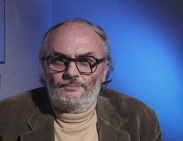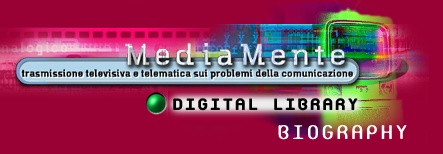 |
Mario Ricciardi
|
Interview
Biography
Mario Ricciardi teaches Modern and Contemporary Italian Literature, humanistic computer
technology and the theory and practice of new media at the Faculty of Literature and
Philosophy at Turin University. He graduated from Turin, having studied under Giovanni
Getto. In 1968 he was awarded a scholarship in the history of modern and contemporary
Italian literature. In 1974 he was nominated as assistant lecturer in this field, in 1977
lecturer and in 1980 associate professor of Italian literature. Since 1986 he has been
professor of Italian Language and Literature at the University of Parma.
In 1991 he was appointed to the chair of Italian Literature in the Second Faculty of
Literature and Philosophy of Turin University and since 1984 he has held the chair in
Modern and Contemporary Italian Literature in the Communication Science course of the same
university.
He has contributed to many scientific seminars and conferences and to several
operational projects, including: computerised support for the "Libro Cuore"
exhibition of Turin in 1989; the construction of a hypertext on "total quality"
for ISVOR-FIAT; a data base for a project on the cultural heritage, archives and libraries
of Piemonte East.
Academic and scientific titles:
- Member of the Scientific Committee of the "Natalino Sapegno" Foundation.
- Member of the Scientific Committee of the Academy of Mediterranean Studies for which he
directs the School of Computing and Humanities.
- Member of the board of directors of FOR.COM,(international and interuniversity
consortium for communication training).
- Member of the board of directors of CESMEO.
- Member of the permanent consultative commission on cultural heritage, archives and
libraries of Piemonte East for the Piemonte Region.
- Representative of the Rector of Turin University for the Multimedia Park project (the
construction of a technological park for production and training in multimedia).
|



 

|
Bibliography
- Recensione a E. Eisenstein, La rivoluzione inavvertita, Il Mulino 1985; in L'Indice 1985.
- Gli ipertesti in L'Indice, 1990.
- Testi virtuali e tradizione letteraria, "Atti" for the History and Computing
Conference, Bologna 28 August-2 September, pp. 83-100.
- Studi umanistici e nuove tecnologie, prolusione per l'inaugurazione dell'a.a. 1992-1993
of Turin University.
- Alla ricerca del lettore attrezzato, in Letteratura e critica - Esperienze e forme del
'900, La Nuova Italia editrice, pp. 277-310.
- Ipertesti e nuove biblioteche in "Biblioteca - Metafore e Progetti", Angeli
editore, pp. 215-231.
- Oltre il testo: gli ipertesti (ed.), Franco Angeli editore, pp. 5-245.
- Studi umanistici e nuove tecnologie in "Oltre il testo: gli ipertesti", Franco
Angeli editore; pp. 9-40.
- Analisi qualitativa dei testi e tradizione dei generi: l'esempio del romanzo
cavalleresco in "Macchine per leggere. Tradizioni e nuove tecnologie per comprendere
i testi", by Claudio Leonardi, Marcello Morelli and Francesco Santi. Fondazione Ezio
Franceschini. Centro Italiano di Studi sull'Alto Medioevo. Spoleto, pp.Ê101-170.
- Indici di parole e mappe mentali, in "Tabula in fabula. Dal racconto degli indici
alla retorica del testo elettronico" by Claudio Leonardi, Marcello Morelli e
Francesco Santi. Fondazione Ezio Franceschini. Centro Italiano di Studi sull'Alto
Medioevo, Spoleto; pp. 361- 386.
- Riti di passaggio, introd. a Scrivere, comunicare, apprendere, cit., pp. 5-13.
- Letteratura e nuovo mondo in Scrivere, comunicare, apprendere, cit:, pp 15-66.
- Scrivere comunicare apprendere con le nuove tecnologie, Bollati Borighieri, Torino; pp.
235.
- Introduction to Giovanni Degli Antoni, "Le tecnologie dell'informazione - una
silenziosa rivoluzione cognitiva", Angeli editore.
|
 |
|



